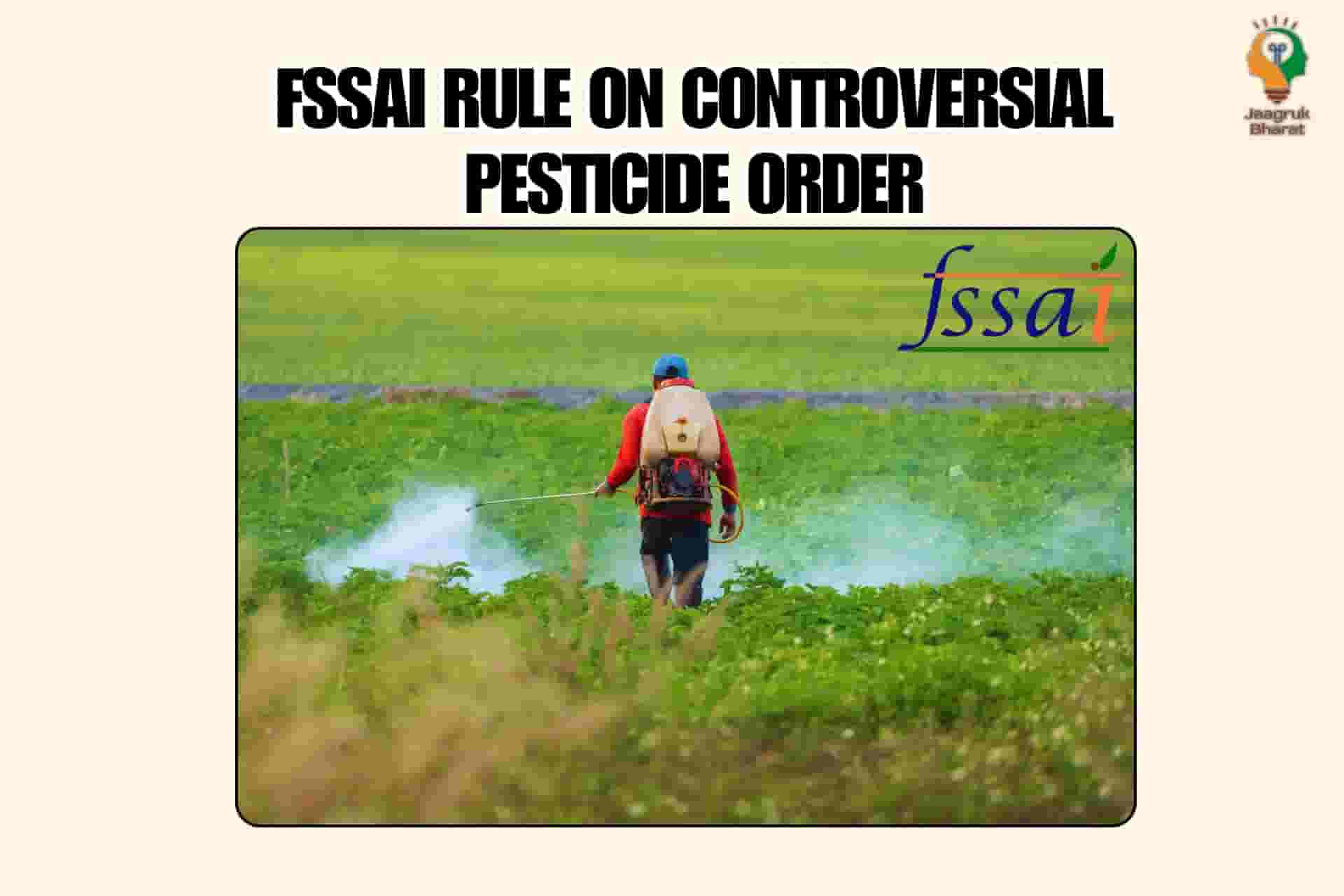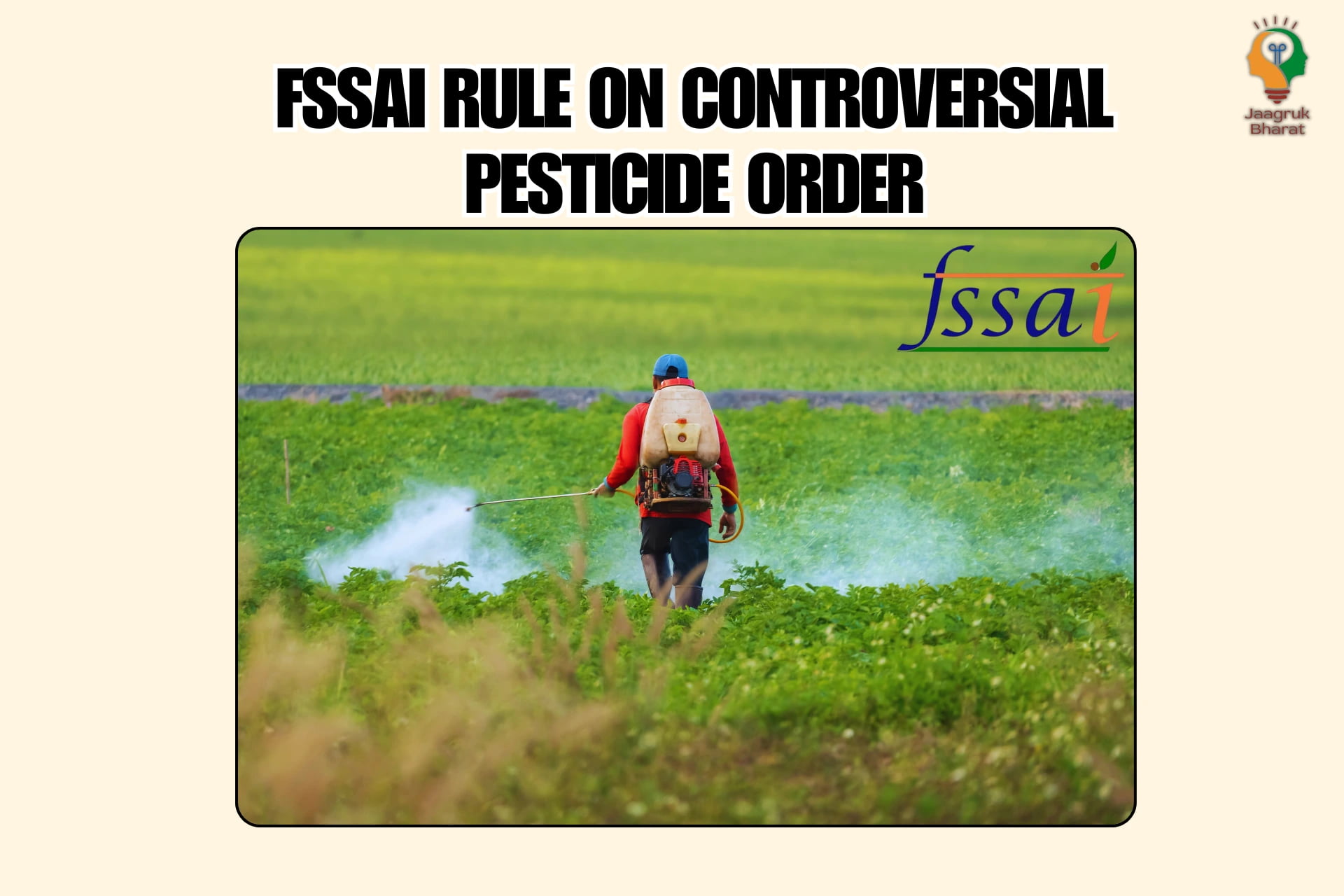New FSSAI Rule On Controversial Pesticide Order
Updated: 15-01-2026 at 5:30 AM
1k


A recent notification by India’s Food Safety and Standards Authority of India (FSSAI) significantly enhancing permissible limits of pesticide content in spices has stirred anxieties among public health experts and environmentalists alike.
FSSAI has increased key pesticides' maximum residue limits (MRLs) by 5 to 10 times the previous thresholds in essential spices like pepper, cardamom, cumin, ginger, and cinnamon. For example, MRLs for the widely used organophosphate pesticide chlorpyrifos have been hiked from 0.01 parts per million (PPM) to 0.5 PPM in black pepper.
Likewise, limits for the herbicide glyphosate in ginger have been scaled up from 0.05 PPM to 1 PPM. Farm union bodies, though, have welcomed the move to align domestic regulations with global standards, claiming this would ease spice exports.
Read more: Ayushman Card
About The Food Safety And Standards Act Of 2006
The Food Safety and Standards Act Of 2006 is a law enacted by the Indian parliament to manage the food industry and ensure food safety across India. After the enactment of the act, the Food Safety and Standards Authority of India (FSSAI) was established as a direct authority for setting standards and monitoring the quality of food. The FSSAI works under the Ministry of Health and Family Welfare.
What Are The Health Implications Of FSSAI’s Controversial Pesticide Order?
-
Pesticides, despite enabling agricultural productivity, carry well-established risks of bioaccumulation within human bodies upon excessive exposure. Chlorpyrifos, for instance, remains classified by the United States Environmental Protection Agency (USEPA) as “likely to be carcinogenic,” having links with lung cancer, brain damage, and developmental disorders.
-
Regulatory experts argue that FSSAI’s 100-fold MRL enhancement for chlorpyrifos in key spices contradicts its statutory objective of ensuring the safety of Indian consumers.
-
Higher tolerance thresholds could promote excessive spraying by farmers chasing better crop yields, risking contamination of India’s culinary staples.
-
Aflatoxins in spices like red chilli powder have already wreaked havoc in the past. The latest dilution of pesticide norms, despite a lack of adequate testing infrastructure, poses more health hazards, warns activists.
-
Regular dietary ingestion of pesticide residues through spices can impact kidney functions, hormonal activity, and respiratory health over the long term.
-
FSSAI, though, defends its move, claiming revised limits match global benchmarks set by bodies like the European Union (EU) and the Codex Alimentarius Commission.
Read more: eShram Card
What Are The Environmental Risks Of Increased Pesticide Usage On Farms?
-
Besides health impacts, enhanced tolerance for chemical pesticides also poses environmental side effects associated with soil degradation and loss of biodiversity.
-
For example, rampant use of glyphosate to protect ginger crops has been linked with the destruction of local vegetation, increased water toxicity, and the loss of pollinating species like bees, butterflies, etc., which maintain ecological balance.
-
Its carcinogenic impact on farmers through skin exposure has led to bans or restrictions in many countries. However, by raising MRLs for glyphosate in spices by 20 times, India risks higher environmental contamination as well as occupational exposure for marginal farmers.
Read more: Aadhaar Card
What Are The FSSAI Standards for Spices?
FSSAI rules comprise a specific standard for spices to ensure that they stay pure and safe. Some of the key FSSAI standards are:
- Purity: Species should be free from any form of malpractice, such as mixing artificial colouring, chemicals, etc., that might attack their purity.
- Maximum Residual Limits (MRLs): FSSAI has set a certain limit on the residue of pesticides used in spices so that the spices remain safe for consumption.
- Check for toxins: FSSAI rules mandate the testing for toxins such as aflatoxins, which aren’t good for spices.
- Packaging: Spices are to be labelled and packaged with the name of the product, ingredients, net weight, expiry date, and related information to the FSSAI rules.
What Are The Effects On Export And Culinary?
The effects of FSSAI rules for spices on the export and culinary industry, as mentioned below in brief.
Impact On Export
- Global acceptance: The FSSAI rules align with the international food safety standards that help Indian spices gain better acceptance in global markets.
- Increased export: The FSSAI rules help the Indian food industry maintain the quality of spices, which makes them appealing in the international market, thereby increasing exports.
- Expanded market: The market for Indian spices has increased as there is a high demand for Indian spices in international waters as well.
- Trust: Following the FSSAI rules, India has gained the trust of its consumers from both India and people from other countries.
Impact On The Culinary Industry
- Quality: The FSSAI rules ensure that the quality and flavour of the spices are maintained and enhanced with safe and clean practices.
- Food safety: As there are strict measures of safety set by the FSSAI rules, this instills trust in the minds of consumers.
- Ingredients: The FSSAI rules mention that the ingredients used should be of high quality without any compromises.
- Innovation: The FSSAI rules support the chefs in innovating and creating creative dishes with high-quality and safe spices.
Conclusion
The Food Safety and Standards Authority of India (FSSAI) is a crucial body in the domain of cooking, which ensures that all the spices supplied follow the standard protocol set by the authority for the safety and security of consumers.
Stay updated with Jaagruk Bharat to get the latest information on government healthcare schemes and more, and reach out to us via our community page if you have any questions.
0
0
1k
0
0
1k Views
0
No comments available





Our Company
Home
About
T&C
Privacy Policy
Eula
Disclaimer Policy
Code of Ethics
Contact Us
Careers
Cancellation & Refund Policy
Categories
Women
Insurance
Finance
Tax
Travel
Transport & Infrastructure
Food
Entertainment
Communication
Government ID Cards
E-commerce
Traffic guidelines
Miscellaneous
Housing and Sanitation
Sports
Startup
Environment and Safety
Education
Agriculture
Social cause
Employment
Disclaimer: Jaagruk Bharat is a private organization offering support for documentation and government scheme access. We are not affiliated with any government body. Official services are available on respective government portals. Our goal is to make processes easier and more accessible for citizens.
All Copyrights are reserved by Jaagruk Bharat